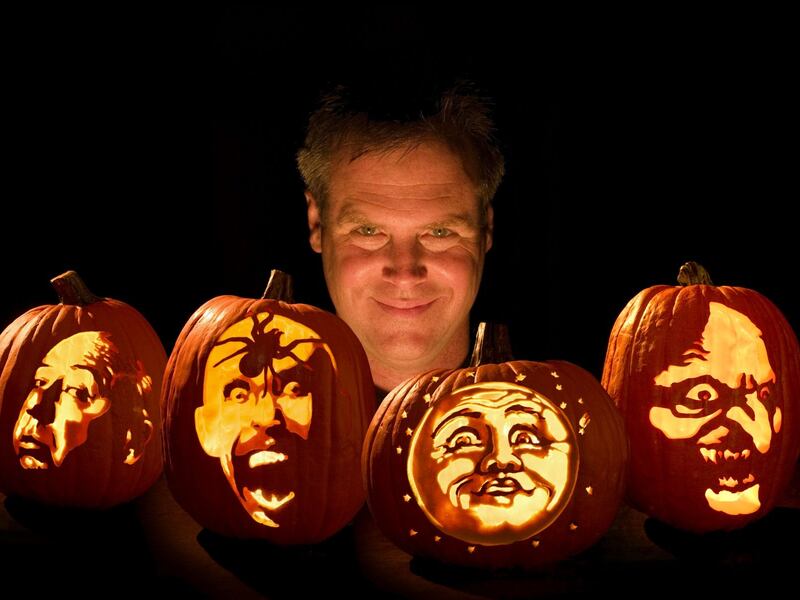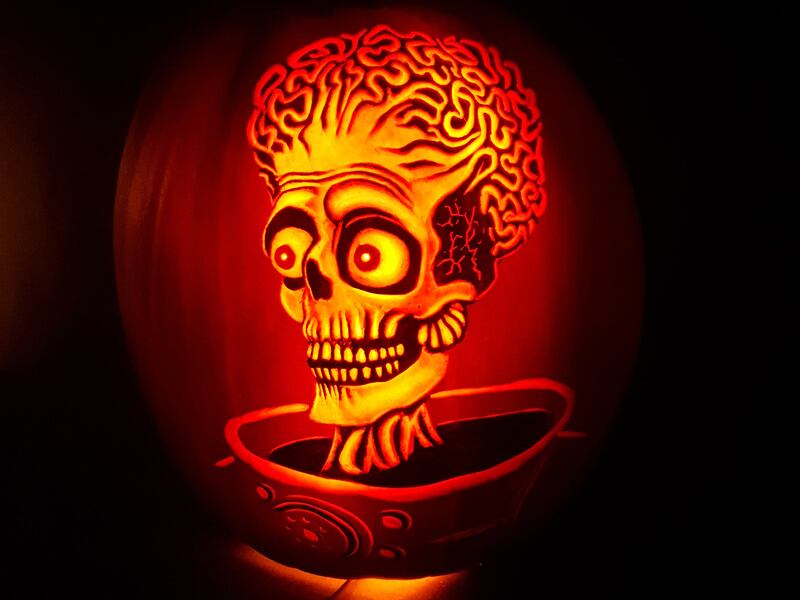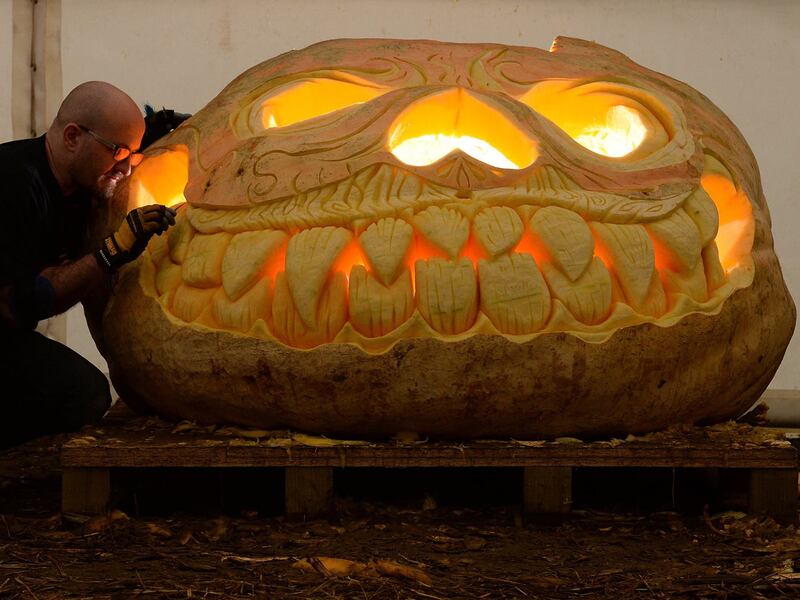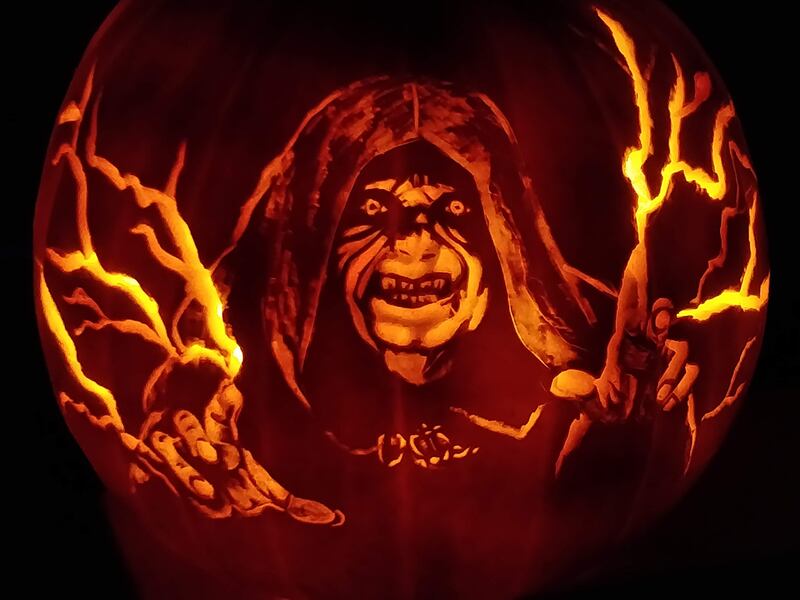
4 Ways to Elevate Pumpkin Carving to an Art this Halloween
October 18, 2021
Following canceled events in 2020 and the recent easing of lockdown restrictions, retailers in the U.S., Canada, and the U.K. are expecting the biggest Halloween celebrations in years, with American consumers alone expected to spend a staggering $10.4 billion on Halloween 2021. So, if ever there was a time to go all out, it’s now—and according to design experts, this year’s top trend is for a pumpkin display that verges on art.
But how to select, design, and carve—or commission—your gallery-worthy pumpkins? Here, four professional carvers share their advice on creating bespoke pieces that are sure to steal the show in spooky style.
1. You Can’t Be Too Inventive

Pumpkin carver Gene Granata of Masterpiece Pumpkins has been at the top of the carving profession for 25 years. He’s created bespoke pumpkin art for Hollywood actor Nicolas Cage and talk show host Ellen DeGeneres, and, most recently, he’s worked on commissions for Halloween Kills (the latest installment of the Halloween movie franchise, currently on screen in North America and the U.K.).
His creations are made using two techniques: stenciling and sculpting. Stenciling sees the pumpkin’s skin cut to create holes. Sculpting is when outer layers of the pumpkin’s skin are removed to differing depths to allow light through when the fruit is lit.
For this year’s display, Granata recommends creating a scene or montage. “The idea is to design pumpkins that interact with each other,” he says. “For example, you could create a large, scary-faced pumpkin and then a series of smaller ones looking afraid. Or a zombie appearing to climb out of the ground, with one pumpkin as his face and another as his hand. Come up with something unique to make people look twice,” he says.
When it comes to commissions, he recommends letting your imagination run riot. “The sky’s the limit. The more inventive, the more amazing the final product will be,” he enthuses.
Related: See Why Top Collectors Are Investing in Craft
2. Pick the Right Pumpkin

U.K.-based carver Jamie Jones of Pumpkin Freak, who regularly takes on movie commissions and has worked with Warner Brothers this year, believes a carving only becomes art if it’s on the perfect pumpkin.
“Look for one with a long stem, and always pick the heaviest of similar-sized options,” he advises. “Then check the skin for any dark patches or bruising and make sure the stem isn’t grey or soft.” He also suggests creating a design on paper and then attaching it to your pumpkin to guide your work. For the carving itself, he recommends using wood carving chisels, clay ribbon cutters, or Lino cutters.
Jones isn’t keen on real candles to illuminate his creations. “I use waterproof rechargeable outdoor lights,” he says. “Put them on when it gets dark and they’ll last for around five hours.” LED spotlights are another good option. For commissions, he recommends selecting “a specific theme or supplying images of people.”
Related: Discover 4 Celebrity Florists’ Secrets to Great Flower Arranging
3. Use the Right Tools

“I absolutely live for Halloween, it can’t come round soon enough for me,” says avid horror fan and artist Christian Russell of All Carved Out. Although he’ll happily take on smaller pumpkins, Russell has made a name for himself carving giant jack-o’-lanterns. Back in 2017 at York Maze in England, he carved what was then (unofficially) the world’s largest pumpkin—weighing in at just under a ton.
His top tip for creating pumpkin art is simple but effective. “Everyone hates scooping out the pumpkin, but using the right tools—like a sturdy metal ice cream scoop—makes short work of clearing the insides,” he says. He then recommends using a very sharp knife, “the sharper the better to create clean lines.”
If you’re trying the sculpting technique, “The trick,” Russell says, “is to go as deep as possible without breaking the flesh. This creates dark shadows and makes the finished carving ‘pop’.” Or, if you’re cutting right through, he recommends drawing straight on to your pumpkin and following those lines to create your design.
Related: Find 6 Pieces of Master Craftsmanship to Add to Your Home
4. Consider the Details

Nick Folkes of South Coast Pumpkins, who takes on around 30 Halloween commissions each year and has created pumpkin art for Penguin Books and the U.K.’s Jubilee Sailing Trust, has an unconventional starting point.
“The first thing is to cut a hole in the bottom of the pumpkin, not the top. It looks a lot better when it’s finished,” he shares. When it comes to scooping out the insides, he stresses that it’s “really important” the flesh should remain a consistent thickness.
For commissions, Folkes believes it’s best to go with a description of what you’d like and allow your artist of choice to find the visual references. And for him, taking a photo of the finished creation is as important as the carving itself, in order to create a permanent record. “I wish I could do this all year round,” he grins.
Banner image: Getty Images


